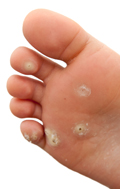Warts are growths on the skin caused by the human papillomavirus (HPV). They are very common, particularly in school-age children.
Warts can spread by direct contact to other parts of the body, or to others. They are painless unless they appear on the soles of the feet.
Types of Warts
Warts are sometimes described by their appearance or location:

- Common warts (verruca vulgaris) can appear anywhere on dry skin, but they are more commonly seen on the hands. They can appear in clusters.
- Flat warts are often on the face or legs. They are smaller and can be difficult to see.
- Plantar warts (foot warts) are located on the soles of the feet. The weight of the body pushes them into the deeper tissues, which can make them painful.
The wart virus (HPV) is very common. Most people who are exposed to the virus do not develop warts. This is because their body’s immune system recognizes the HPV virus and attacks it before it can start a growth.
The HPV virus enters the skin through a small scratch or wound. This explains why warts often appear around fingernails where the skin is often dry or cracked. After the skin becomes infected by the HPV virus, skin cells to start reproducing more rapidly. This creates small bumps where the skin becomes a bit thicker than the surrounding skin. The infected skin may also have a slightly different color. It can take 12 months for the growths to appear after an infection with the virus.
Even those who develop warts may find that they disappear on their own without treatment.
It seems In those cases, the warts go away when the body’s immune system finally recognizes the virus as foreign and starts to attack the underlying infection. Warts tend to heal on their own within 2 years in children and 5 to 7 years in adults.
Wart Treatment


These commonly used treatments remove warts more quickly:
- Occlusion—covering the wart in a bandage or strip of tape
- Over the counter medications (salicylic acid)
- Cryotherapy (freezing)
- Electrosurgery
- Prescription medications
Warts have a tendency to return, so repeated treatments may be necessary.
There are additional treatment options for warts that are widespread, do not respond well to standard treatments, or keep returning.